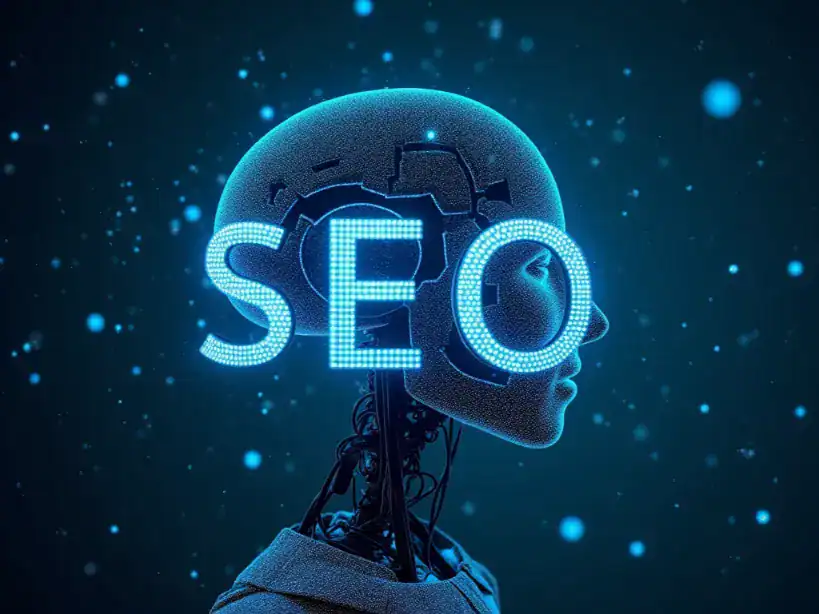AI in SEO: 7 Proven Ways to Boost Rankings [2025]
The New SEO Landscape with AI – Adapt This: The SEO landscape is changing fast, with Artificial Intelligence leading the charge. AI technology empowers SEO professionals and marketing teams by automating SEO tasks, providing valuable insights for data-driven decisions, and refining almost all aspects of SEO. An AI-driven SEO strategy means more efficient SEO practices, better search engine rankings, and a vital competitive edge. We’re using machine learning and deep learning algorithms for unmatched analytical capabilities in improving SEO and understanding the evolution in search technology.
In short, AI is a powerful tool for developing an effective content strategy that maximizes online visibility and performance. Below, we break down every aspect of AI-driven SEO in a comprehensive, actionable format that covers everything from SEO strategies and AI-powered tools to nuanced approaches for improving user experience and performing advanced data analysis.
Throughout this guide, you’ll discover how to seamlessly integrate cutting-edge technology into your SEO efforts to boost search engine rankings and achieve sustainable success on your affiliate platforms.
Key Takeaways:
- AI Transforms SEO: Artificial intelligence is revolutionizing SEO by automating tasks and improving content relevance.
- Automate and Optimize: Use AI-powered tools for content generation, keyword research, and SEO audits.
- Content Strategy is Key, Enhanced by AI: Craft high-quality, SEO-optimized content using AI insights for topic selection and user intent.
- Focus on User Experience: AI helps optimize for better user engagement, including site speed, mobile-friendliness, and visuals.
- Data-Driven Decisions: Leverage AI for advanced analytics, competitive analysis, and performance tracking.
- Future-Proof SEO: Stay ahead by adapting to evolving search trends and continuously integrating new AI tools.
Your First Steps: Making AI-Powered SEO Work for You (It’s Easy!)
“AI in SEO” sounds advanced, but starting is simple, especially for motivated self-starters targeting smarter engagement with their target audience. Think of Artificial Intelligence tools as smart assistants for your SEO efforts.
This guide offers Digital Beginners actionable steps to integrate AI for SEO into their digital strategy:
- Define Your SEO Goals Clearly:
- Before using any AI-powered tool, know your aim. More organic traffic to your WarriorPlus affiliate program review? Better online visibility for beginner affiliate tutorials? Clear goals guide your effective AI SEO strategy and tool selection.
- Beginner Tip: Start small. Use an AI-driven tool to find three content gaps this week. This builds momentum for your SEO content creation.
- Explore Beginner-Friendly (Often Free) AI SEO Tools:
- You don’t need a big budget for AI-powered SEO. Many artificial intelligence tools offer free trials, perfect for learning AI driven SEO and optimizing resource allocation.
- Key Tools for Actionable Insights:
- Content & Keyword Ideas:
-
-
- AnswerThePublic: Visualizes queries, giving valuable insights into search intent and search patterns.
- Google Keyword Planner: For initial keyword analysis and search volume checks.
- Use awesome ChatGPT prompts for brainstorming content strategies.
-
-
- Keyword Research:
-
-
- Ubersuggest (Free): Offers keyword data and competitor insights.
- Ahrefs Free Keyword Generator: Finds high-impact keywords.
-
-
- Content Readability:
-
-
- Hemingway Editor: Improves readability of content for better user experience and SEO performance.
- Grammarly (Free): Ensures high-quality content is error-free.
-
-
- Actionable Task: Pick ONE tool. Sign up. Spend 30 minutes exploring its features for actionable insights for website optimization and understanding the science behind user interactions.
- Focus on ONE Core SEO Task with AI:
- AI assists with many SEO tasks: keyword research, content optimization, SEO analysis. Don’t try all at once; avoid overwhelm when facing vast amounts of data.
- Expert Analysis: For beginners, using AI for content outlines or improving existing articles offers quick wins. Content quality is key for search engine rankings and a solid long-term content strategy.
- Your First AI Task (Quick Win):
- Take an old blog post.
- Use a free AI writer (perhaps a ChatGPT alternative) for three new H2s, focusing on keyword optimization.
- Ethically use an AI paraphraser on one paragraph. Always edit AI output for originality and your unique voice. Know how to avoid AI detection.
- Learn Basic AI & SEO Terms:
- Understand “AI algorithms,” “machine learning for SEO,” “natural language processing,” and “Generative AI.” This boosts confidence for informed decisions. Learning how ChatGPT works helps.
- Resource Tip: Watch beginner YouTube videos on “AI in SEO basics” – visual content aids understanding.
- Adopt a “Test, Learn, Iterate” Mindset for Continuous Improvement:
- AI is a powerful tool, not magic. What works for one site may need tweaking. The SEO landscape and AI technology ensure a continuous learning process.
- Be curious! Experiment with prompts in AI SEO tools. Analyze results. Refine your approach to SEO. This builds AI-driven strategies.
Follow these steps to feel empowered by AI in SEO. Integrate these cutting-edge tools to support your online strategies, achieve better conversion rates, and make your side-hustle successful.
AI in Content Creation: Ethical Guide to High-Ranking, Engaging SEO Content
AI in SEO for content creation is huge. Can Artificial Intelligence tools write posts that hit high search rankings and boost affiliate marketing? Yes, with a strategic approach and focus on customer satisfaction.
AI’s Growing Power in Your Content Strategies
AI-powered tools, with Generative AI and natural language processing, are vital for content marketing efforts:
- Idea Generation & Outlines: AI brainstorms topics and outlines by analyzing search trends for your target audience, including ideas for types of evergreen content.
- Drafting Content: AI produces first drafts for articles or product descriptions, speeding up the content creation process.
- Content Optimization: AI finds relevant keywords, improves readability, and aligns content with user search queries. It can also perform sentiment analysis.
- Language Refinement: AI helps create professional messages for diverse English-speaking countries, key for smarter engagement with niche audiences.
Warning: Ethics & Quality with AI-Generated Content – The Human Touch is Key!
Relying only on AI-generated content without human touch is risky for Digital Beginners.
- E-E-A-T: Search engines favor Expertise, Authoritativeness, Trustworthiness. Pure AI-generated content often lacks genuine human experience and valuable insights.
- Generic Content Risk: Similar AI prompts lead to repetitive content. Stand out in a competitive marketplace with unique, high-quality content.
- Factual Errors (“Hallucinations”): AI can be wrong. Fact-check, especially with data or comparisons like Bard vs GPT-4.
- No Unique Voice: Readers connect with personality. AI can sanitize content, losing the voice that builds loyalty and enables deeper interaction.
Expert Strategy: The Hybrid “Human + AI” Model for Top SEO Content & Content Effectiveness
The best approach to SEO content creation is the “Hybrid Model” for content quality.
- AI as Assistant, You as Editor:
- Use AI for research, outlines, drafts.
- Crucially, add your expertise, experiences, and unique voice. Your human touch is vital.
- Fact-check AI output.
- Rewrite AI drafts for clarity, flow, and readability of content.
- Focus on “AI-Augmented” Content:
- View AI solutions for SEO as tools that boost your abilities.
- Use AI for gap analysis to find where your unique view adds value.
- Workflow: AI-Augmented High-Quality Content Creation:
| Step | Action | AI Focus | Key Keywords Targeted |
| 1. Research | Use AI SEO tool for low-competition, high-impact keywords. Analyze search intent for your target audience. | Keyword research, AI for SEO analysis | relevant keywords, search query, user intent, keyword analysis, search patterns |
| 2. Outline | AI writer generates outline targeting keywords, using its pattern recognition capabilities. | AI for content, ChatGPT use cases | creation of content, content strategies |
| 3. AI Draft | AI drafts sections. | AI in content writing, Generative AI | AI-generated content (base) |
| 4. Human Touch | Rewrite AI draft. Add personal insights. Solve audience pain points. | Your expertise, human touch | high-quality content, valuable insights, content relevance, readability of content, content effectiveness |
| 5. SEO Polish | Tools (Surfer SEO, Rank Math) refine keyword optimization, meta descriptions (metadata for machine readability). | SEO analysis, AI powered SEO tools | keyword rankings, level of SEO optimization, organic traffic, search engine visibility, content optimization |
| 6. Readability | Hemingway Editor ensures clear, accessible content (8th-grade reading level ideal). | Readability, user experience | readability of content, seamless user experience, user satisfaction |
This hybrid model uses AI in content writing efficiently while ensuring content quality, authenticity, and trust—key for online income and a strong SEO strategy.
Your AI SEO Toolkit: Top Free & Freemium Tools for Beginners (Maximize Impact, Minimize Cost)
AI SEO tools can seem complex, but you can achieve great SEO performance without high resource expenditure. For value-seeking Digital Beginners, free and freemium AI-powered tools are a smart digital approach to master AI powered SEO. Knowing how a chatbot can make you money starts here.
This list highlights AI-driven tools for newcomers to SEO technology.
1. Understanding Search Intent & Finding Content Ideas
- Google Keyword Planner:
- AI’s Role: Its data fuels many AI tools, using Google’s search engine algorithms.
- Use Case: Discover keywords, understand search volume, gauge competition. Vital for keyword strategy and AI for SEO analysis.
- Cost: Free (Google Ads account needed, no ad spend).
- Action: Input a topic (e.g., “drone reviews”). Find long-tail keywords with clear search intent.
- AnswerThePublic:
- AI’s Role: Maps search queries. Backend uses AI in SEO research.
- Use Case: Brainstorm titles, FAQs, understand user behavior for AI for content. Identifies content gaps.
- Cost: Limited free daily searches.
- Action: Enter your niche (e.g., “passive income strategies”). Pick a question for your next high-quality content piece.
- Ahrefs Free Keyword Generator / Semrush Keyword Magic Tool (Free): (A Semrush review 2023 offers more).
- AI’s Role: Use AI algorithms and machine learning for keyword analysis.
- Use Case: Get keyword ideas, search volume, difficulty scores. Limited but great for initial SEO analysis.
- Cost: Robust free versions.
- Action: Compare a keyword in both for varied actionable insights.
2. Crafting & Optimizing Content with AI
ChatGPT (Free) / Google Gemini (Free):
-
- AI’s Role: LLMs using natural language processing. Knowing how ChatGPT gets information helps prompting.
- Use Case: Brainstorm titles/outlines for content creation; draft sections (personalize!); generate meta descriptions for search engine visibility; simplify topics for readability of content.
- Cost: Free (limits on new models).
- Action: Ask Gemini/ChatGPT to “rewrite this complex sentence for an 8th-grader.”
Hemingway Editor:
-
- AI’s Role: Algorithmic readability analysis. AI-aid for clarity in content optimization.
- Use Case: Ensure clear, concise content for your target audience, improving navigation experience and potentially reduced bounce rates. Essential for user satisfaction.
- Cost: Free (web).
- Action: Paste your post. Lower the grade score by simplifying.
Grammarly (Free): (A Grammarly Premium review shows advanced analytical capabilities).
-
- AI’s Role: AI for grammar, spelling, style. Boosts content quality.
- Use Case: Polish content for professionalism, enhancing online visibility.
- Cost: Robust free version.
- Action: Install browser extension for real-time checks.
3. Monitoring Your Website’s SEO Health
Google Analytics & Google Search Console:
-
- AI’s Role: Use AI algorithms and machine learning for SEO to process data, spot search trends, offer AI-driven insights (GSC reports), detect issues. Key for performance tracking.
- Use Case: Analytics: Traffic sources, popular content, user behavior. Search Console: Keywords driving organic traffic, sitemaps, technical website optimization issues impacting search engine indexing.
- Cost: Free.
- Action: Set up if new. Check GSC “Performance” weekly for queries driving users—gold for AI for SEO analysis and keyword strategy.
Expert Advice: Choosing Your First AI SEO Tools
Don’t master all SEO automation tools at once. For an AI-driven SEO strategy:
- Content Ideas: Start with AnswerThePublic for consumer searches.
- AI Writing Aid: Use ChatGPT/Gemini (free). Explore ChatGPT alternatives later.
- Polishing: Always use Hemingway Editor & Grammarly for readability of conversations.
- Monitoring: Review Google Search Console weekly for AI-driven insights.
These free/freemium AI SEO tools build your AI powered SEO foundation without risk, empowering your journey to online income. This strategic thinking prepares you for advanced SEO technology.
The Future of AI in SEO: Preparing for Tomorrow’s Search Success, Today
Learning AI in SEO now is crucial. It’s a shift in digital marketing and online marketing. For Digital Beginners, understanding the future of SEO with Artificial Intelligence is key for long-term success. The AI future of SEO impacts keyword rankings and user experience.
Key Trends: AI’s Evolution in Search Technology
- Hyper-Personalized Search:
- The Change: Search engine algorithms, with AI algorithms and deep learning frameworks, will better decipher search intent for custom results. Your AI in search experience will be unique.
- Impact: Understand niche audiences deeply. Your SEO strategy hinges on relevant content answering specific queries, moving to topical authority and content personalization.
- AI-Powered Search Engines & Conversational AI:
- The Change: Tools like Perplexity AI and Google’s SGE mean AI summaries for answers, potentially more zero-click searches. A major SEO impact of AI.
- Impact:
- Opportunity: Your high-quality content could train AIs or be cited. This includes creation of materials that are insightful.
- Challenge: Fewer clicks for simple queries. Focus on content AI can’t replicate: unique experiences, case studies, strong opinions. Provide a relevant experience.
- Expert View: Some SEO professionals fear less traffic. More likely, traffic type changes. Sites with expertise, seamless user experience, and value beyond facts will win.
- Advanced AI for Content Quality & E-E-A-T:
- The Change: Search engines will use advanced AI for SEO analysis for content quality, checking E-E-A-T. Accuracy of search results depends on this.
- Impact: Pressure for valuable, original, human-centric content grows. Basic AI in content writing for generic articles fails. Authenticity is key for SEOOrganic Traffic GrowthThe.
- Sophisticated SEO Automation:
- The Change: SEO automation tools handle complex tasks: predictive analytics for search trends, automated audits with AI fixes, dynamic content optimization via real-time user behavior.
- Impact: Frees you for strategy, creativity, connection with customers. SEO fundamentals still needed to guide AI solutions for SEO.
How Beginners Can Thrive in AI-Driven SEO’s Future:
- Continuous Learning: The SEO impact of AI and search engine dynamics evolve fast. Weekly, research new AI SEO tools, search trends, AI-Driven Strategies. Explore Nvidia AI news or how chatbots on business websites improve initial engagement.
- Topical Authority: Build content clusters. Show expertise to satisfy search engine indexing. Key for organic search visibility.
- Elevate User Experience (UX): A fast, intuitive site is vital. Great UX is core to SEO practices, impacting user satisfaction, conversion rates. Focus on load times, visual content.
- Unique Brand Voice & Community: With more AI-generated content, your personality differentiates. Especially for affiliate marketers needing trust and a personal level connection.
- Leverage AI Wisely: View AI solutions for SEO as assistants. Use Artificial Intelligence to amplify human strengths. While AI is taking over tasks, human oversight and expert strategy are vital.
The future of SEO uses AI technology and machine learning. Understand shifts in search behavior, adapt your SEO strategy hinges on these, focus on continuous improvement, and dominate the digital landscape, turning side-hustles into online income.
In short, Artificial Intelligence is reshaping how we approach SEO. Use AI-driven tools and insightful strategies—from understanding natural language interactions to optimizing for voice search nuances—to boost SEO performance. An effective AI SEO strategy blends AI-driven insights with human touch. Start exploring these cutting-edge tools and refining your approach with precision. This improves rankings in search results and digital marketing goals, including Key Performance Indicators (KPIs) like organic traffic and conversion rates. See how ChatGPT has changed SEO forever for more.)
Final Thoughts: AI as Your Partner in SEO Victory
Your AI in SEO journey into the realm of search engine optimization is full of opportunity for those who learn, adapt, and apply AI-Driven Strategies. For Digital Beginners and ambitious side-hustlers, Artificial Intelligence is a transformative partner for smarter work, profound AI-driven insights from Real-Time SEO Analytics, and achieving online income goals within the digital marketing landscape.
By taking these first steps, using accessible beginner-friendly AI SEO tools, committing to ethical creation of content (maybe explore ChatGPT prompt engineering for better AI-generated content), and watching the future of SEO and predictive search, you optimize your success potential. The ultimate SEO strategy combines AI technology’s efficiency, machine learning for SEO’s power, and your vital human expertise, creativity, ability to foster customer feedback, and deeper interaction.
What are your biggest questions on an AI-enhanced SEO strategy or AI algorithms? Curious about backlink strategy or optimization of bounce rate? Share your thoughts below! Let’s navigate this evolution in search technology together, making your SEO efforts lead to success in the digital marketplace. This is your opportunity for enterprises to shine.
References:
- https://www.wsiworld.com/blog/seo-in-the-age-of-ai
- https://www.webfx.com/blog/marketing/how-to-seo-content-ai/
- https://www.smartling.com/blog/is-ai-good-for-seo
- https://www.semrush.com/contentshake/content-marketing-blog/ai-seo-tools/
- https://owdt.com/insight/11-strategies-for-improving-seo-performance-with-ai/
- https://www.getpassionfruit.com/blog/best-on-page-seo-tools-that-actually-work-in-2025
- https://www.creaitor.ai/blog/seo-trends-2025
- https://xponent21.com/insights/the-evolving-search-landscape-ai-monopolies-and-the-future-of-seo/
- https://screpy.com/how-ai-is-shaping-the-future-of-seo/
- https://wetopi.com/how-ai-is-influencing-seo-professionals/
- https://backlinko.com/ai-seo-tools
- https://www.outbrain.com/blog/the-future-of-seo-trends-and-insights/
- https://www.semanticscholar.org/paper/f08cf804cb740c03004ca06e565e20f084a45e60
- https://www.semanticscholar.org/paper/ac5cf8449fc73df96bae67fc981f2278e12239d1
- https://www.semanticscholar.org/paper/5c199c9d146a2cfcb183f97b1fc14fcac630850b
- https://www.ncbi.nlm.nih.gov/pmc/articles/PMC10949203/
- https://www.ncbi.nlm.nih.gov/pmc/articles/PMC10596397/
- https://www.semanticscholar.org/paper/364819ceeae199d54bfbc688a32d9cd0b73de8a1
- https://www.semanticscholar.org/paper/4fe4267decc3a1c9f3f8d5183e8ecf767c3f9325
- https://www.ithelps-digital.com/en/blog/ai-seo-revolution-or-risk
- https://www.seoclarity.net/blog/ways-chatgpt-impacts-enterprise-seo
- https://morningscore.io/how-to-use-ai-for-seo/
- https://neilpatel.com/blog/ai-seo/
- https://searchengineland.com/ai-future-search-436277
- https://www.brightedge.com/glossary/how-has-ai-changed-search-marketing
I’m Alexios Papaioannou, an experienced affiliate marketer and content creator. With a decade of expertise, I excel in crafting engaging blog posts to boost your brand. My love for running fuels my creativity. Let’s create exceptional content together!








